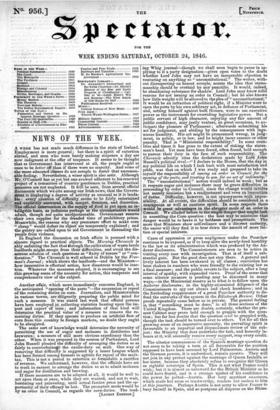Another affair, which more immediately concerns England, is the. anticipated
"opening of the ports "—the suspension or repeal a the remaining duties on corn. Journalists, and Ministerialists in various towns, are diligently preparing the public mind for such a measure. It was stated last week that official persons have been employed in ,collecting statistics bearing upon the im- port and export of corn; and information of that kind will determine the practical value of a measure to remove the re- maining duties. If they operate to produce an artificial flow of corn from this country to foreign markets, no doubt they ought to be abrogated.
The same sort of knowledge would determine the necessity of permitting the use of sugar and molasses in distilleries and breweries; a measure of still more obvious expediency than the other. When it was proposed in the session of Parliament, Lord John Russell pleaded the difficulty of arranging the duties so as fairly to counterbala* the excise-duty on malt. One way of removing that difficulty is suggested by a lesser League which has been formed amongfarmers to agitate for repeal of the malt- tax. This is-not a- period to entertain so forn;Hdable a sacrifice of revenue. We understand, however, that the officials have set to work in earnest to arrange the duties so as to admit molasses and sugar for distillation and brewing.
If these measures are to be Adopted at all, it would be well to act upon them at once, while they are wanted, and not to wait, hesitating and palavering, until actual famine press and the op- portunity of their efficacy be lost. The promptest mode would be by an order in Council, as regards the corn-duties. The lead-
ing Whig journal—though we shall soon begin to pause in ap- plying to it a party designation—gives open voice to the doubt whether Lord John may not have an insuperable objection to venturing on anything so "unconstitutional." The writer, with- out disrespecting an honest scruple, scouts the idea that states- manship should be overlaid by any punctilio. It would, indeed, be abandoning substance for shadow. Lord John may know solid reasons for not issuing an order in Council ; but he also knows how little weight will be allowed to the plea of " unconstitutional." It would be an infraction of political right, if a Minister were to open the ports by his own arbitrary- act, in defiance of Parliament, and, setting himself against both Houses, were to use executive power as the instrument for overriding legislative power. But a public servant of high character, enjoying any fair amount ,of public confidence, may justly venture, on great occasions, to an- ticipate the pleasure of Parliament ; afterwards submitting his act for judgment, and abiding by the consequences with inge- nuous humility. His act might be pronounced wrong, in judg- ment, in policy, or in law, and he might incur censure or other penalty. That is "Ministerial responsibility." In some coun- tries and times it has gone to the extent of risking the states- man's head. Yet men have been found, often found, bold enough to pursue their duty in the face of such responsibility. The Chorniele adroitly cites the declaration made by Lord John Russell's political rival—" I declare to the House, that the day in my political life on which I look back with most satisfaction and pride, was that on which I was ready and prepared to take on myself the responsibility of issuing an order in Council for the opening of the ports, and trustine to you for an act of indemnity." The "unconstitutional" notion would indeed be weak ; but as it respects sugar and niolasses there may be grave difficulties in proceeding by order in Council, since the change would involve not merely remission but a readjustment and even an imposition of duties. Difficulty, however, is not synonymous with impos- sibility. At all events, the difficulties should be considered in a courageous as well as cautious spirit. In some respects there would be great advantages in the abrupter mode of an order in Connell. We alluded before to the single danger that might lurk in unsettling the Corn question : the best way to minimize that danger would be to brave it by boldness and promptitude. The more that Ministers show self-reliance and a discreet audacity, the easier will they find it to bear down the assault of mere fac- tion or special interests.


























